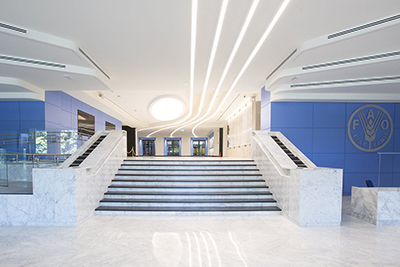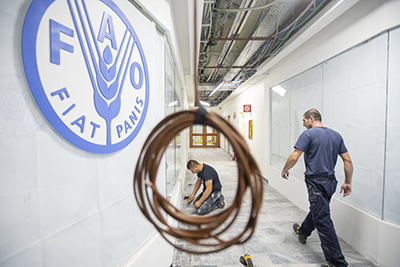FAO in Review: A proud UN Organization for a better world
European Space Agency Astronaut and FAO Goodwill Ambassador Thomas Pesquet at the inauguration of the new FAO selfie point outside FAO headquarters on World Food Day 2022.
© FAO/Giulio Napolitano
Since August 2019, FAO has reshaped its business model, improving efficiency, implementing best practices that support programme and administrative effectiveness, and ensuring capacity and capability of its human resources.
There has been renewed focus on creating people-centred HR policies over the last three years. In addition, the FAO Women’s Committee was launched in 2019 to provide an inclusive, safe space that reflects the diverse and dynamic nature of FAO’s workforce.
“Today, gender equality, diversity and inclusion are very high on the FAO agenda. The Women’s Committee has proven a successful platform to build a meaningful space to share, discuss and showcase ideas and actions that can empower women – and through them, the Organization,” said Deputy Director-General Maria Helena Semedo, Chair of the Women's Committee. “The Committee’s wide range of activities – from the Joint Mentorship Programme, VirtualiTeas, information campaigns and partnerships – is working to advance gender equality and women’s empowerment in FAO and to contribute to a gender-equal world. For instance, our collaboration with the Mountain Partnership and designer Stella Jean in Kyrgyzstan and Peru has allowed mountain women to boost their livelihoods through ethical fashion.”
Attention to gender parity has reaped rewards, highlighted by FAO achieving a score of 94 percent for indicators met or exceeded on the UN Action Plan on Gender Equality, and the Organization recently being recognized for excellence in implementing good practices that advance gender parity in the UN System.
The first-ever FAO Youth Committee has also been created, “providing youth with a dynamic space to foster their innovative spark and to play a key role in the transformation of our agrifood systems, by identifying actionable and out-of-the-box solutions to current and future challenges,” said Chief Economist, Máximo Torero Cullen. “Since its inception, the Youth Committee has led to the creation of the World Food Forum (WFF), which in two short years has grown from an idea to a global intergenerational platform. The WFF demonstrates that the ingenuity and energy of global youth is one of our biggest resources to overcoming global hunger and achieving the Sustainable Development Goals. Going forward we need to continue tapping into this potential energy as well as fostering an intergenerational dialogue among all agrifood stakeholders, ensuring no one is left behind.”


View from a translation booth in the Plenary Hall, FAO headquarters during FAO Director-General QU Dongyu’s opening statement at the World Food Day 2022 celebrations. ©FAO/Pier Paolo Cito; FAO Director-General QU Dongyu and members of the FAO Core Leadership Team visiting staff at the newly renovated catering area on the 8th floor, FAO headquarters. © FAO/Giuseppe Carotenuto
Improving infrastructure
Along with empowering all personnel, the Organization has made many infrastructure improvements and upgrades. FAO’s Logistics Services Director Rodrigo de Lapuerta noted, “We are more than ever working closely with our Decentralized Offices to promote corporate environmental responsibility in many areas including more energy efficiency and installing more solar systems (most recently in Jordan). We are providing technical support for over 140 infrastructure projects in different areas of the world.”
The iconic Plenary Hall at FAO headquarters in Rome hosts FAO Members and partners, united in efforts to ensure global food security. The restoration work of the Plenary Hall’s artistic ceiling was recently completed thanks to the collaboration with the Host Government, Italy, which also supported the modernization and digitization of the Plenary Hall's technical equipment, including enhancing its multilingual capacity.
“The relations between FAO and Italy are very special, as Italy has been our Host Country over the last 70 years, providing significant support to the Organization’s mandate, but also being the “home” for our staff and Members’ representatives in the achievement of its global mandate,” says Maurizio Martina, Assistant Director-General.
“Our reinforced engagement takes many forms, innovative programmatic approaches such as the Mediterranean Dialogue on Food Crisis and the Hand-in-Hand Initiative, the organization of joint advocacy events such as the G20 Green Garden, but also in renewing our house with modern photovoltaic systems and restoring cultural and iconic parts of the building such as the ceiling of the Plenary Hall, the famous Universe of artist Mirko Basaldella.”
The results of successful collaboration are clearly visible in the host city, Rome, and they go beyond FAO's premises. Conceived as a legacy of the Italian Presidency of the G20 in 2021 and representing Members’ commitment to people, the planet and prosperity, the G20 Green Garden is Rome's first garden dedicated to the concept of sustainable development. Evocatively sited in the Parco dell'Appia Antica - an archeologically rich expanse connecting modern Rome to its sylvan past - the space features installations showcasing the "Global Goals," a set of interconnected policy benchmarks that include ending poverty, eradicating hunger and creating sustainable cities.
Improvement work at headquarters has also helped foster a positive working environment: the entrance has seen the addition of a ramp to facilitate access for people with limited mobility, and the installation of energy-saving state-of-the-art lighting has drastically reduced electricity consumption.
The changes demonstrate the values of inclusion, innovation and sustainability. More recently, FAO employees have been able to enjoy the renovated eighth-floor cafeteria at the Rome headquarters. A variety of organic and international food is served and the Organization’s commitment to a policy of zero food waste sees that any daily leftovers are donated to charity.
Deputy Director-General, Laurent Thomas said, “With great pleasure we see staff and Permanent Representatives, partners and other visitors enjoying a completely renovated space, with new catering services and a newly refurbished terrace with hundreds of plants, and also showcasing the FAO GIAHS sites – all in synergy with the new ‘One FAO’ approach.”


Main entrance of FAO headquarters, featuring a new ramp to facilitate access for people with limited mobility and state-of-the-art lighting to reduce electricity consumption. © FAO/Pier Paolo Cito; Infrastructure improvements at FAO headquarters to foster a positive working environment. © FAO/Pier Paolo Cito
Strengthening integrity, accountability and transparency
Further advances have been achieved, with the stand-alone Ethics Office being established in March 2020, to enhance cross-organizational understanding of the obligations of international civil servants and to foster an ethical work environment.
The first edition of the FAO Code of Ethical Conduct was published in May 2021, outlining the clear standards of conduct, values and principles expected of all FAO personnel as they work for the transformation to more efficient, inclusive, resilient and sustainable agrifood systems for better production, better nutrition, a better environment, and a better life - leaving no one behind.
A new Office of the Ombudsperson has been established, to help combat any form of harassment, sexual harassment, discrimination, sexual exploitation or abuse of authority - providing informal conflict resolution services as a key contributor to the new culture of greater integrity at FAO.
A revised Whistleblower Protection Policy was issued in June 2021, guaranteeing all individuals who report concerns protection from retaliation so that the highest standards of efficiency, competence and integrity can be upheld in the Organization.
To further strengthen accountability, integrity and transparency throughout the Organization, additional resources have also been allocated to the Office of the Inspector General to enhance the ability of the Office to quickly deal with any complaints of misconduct.

Newly refurbished 8th floor terrace at FAO headquarters, showcasing photos of FAO Globally Important Agricultural Heritage Systems (GIAHS) sites.
© FAO/Giuseppe Carotenuto
Listening leads to action
“The Employee Satisfaction Survey launched in 2019 served as a catalyst for change across the Organization”, said Human Resources Director Greet De Leeuw. Over 90 staff listening sessions were organized to discuss the survey results and priority areas of concrete action were identified to respond to employee concerns: communication, professional development, creating an ethical workplace and new ways of working.
These conversations sparked further occasions to exchange ideas, such as townhall events, which Greet described as “A first of their kind for FAO that created an excellent opportunity for two-way engagement between employees worldwide and senior managers.”
“Creating an inclusive and positive work environment has been a top priority for me from day one,” the Director-General added. “Let's work together, learn together and contribute together for the benefit of FAO Members.”
A renovated, restructured and dynamic FAO has been forged – the Organization has changed to enable it to better fulfil its mandate with the ‘One FAO’ approach.
